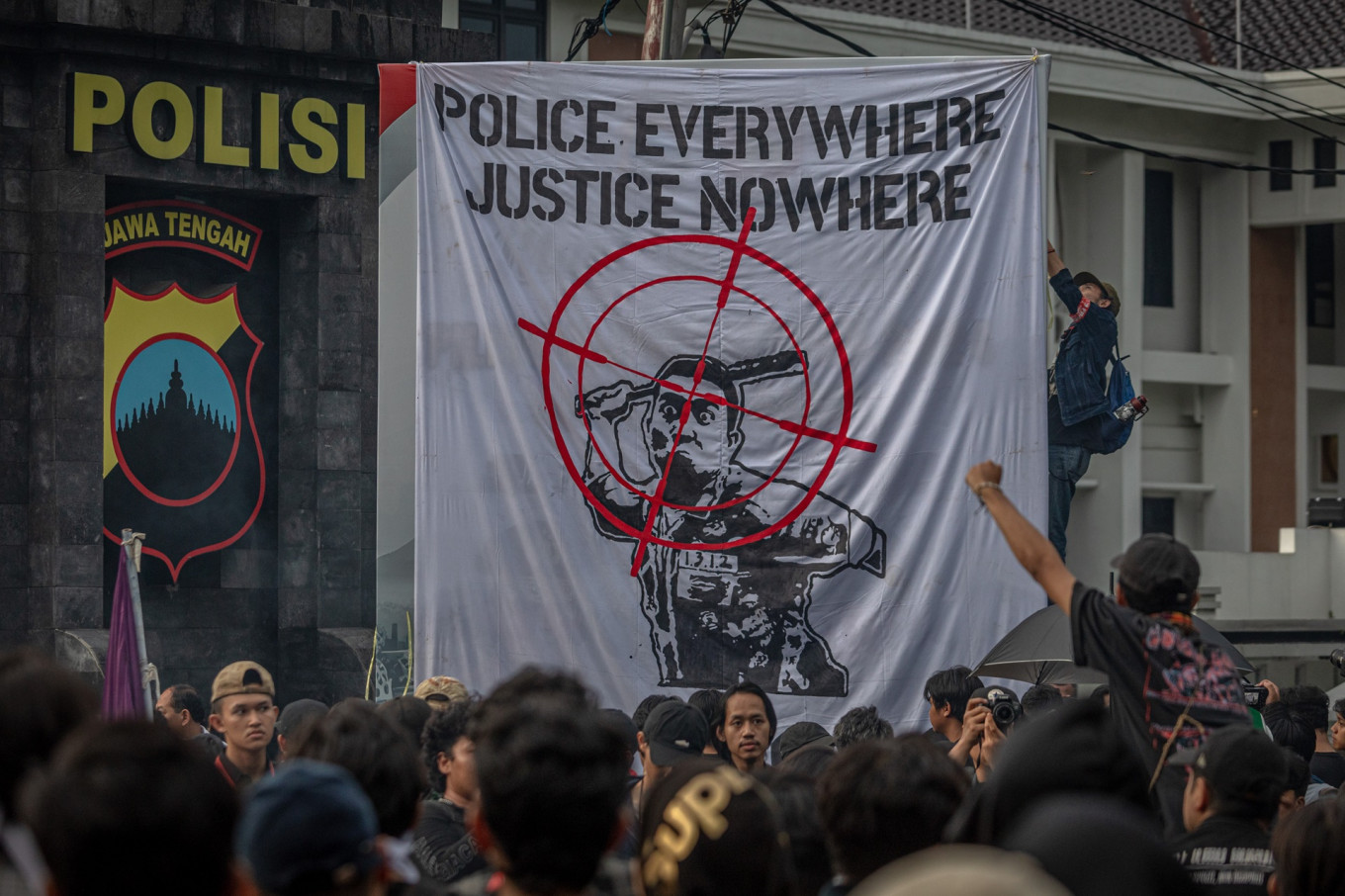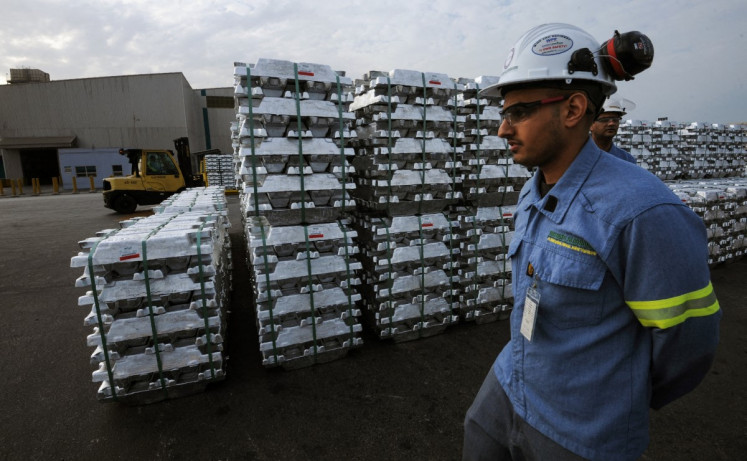Popular Reads
Top Results
Can't find what you're looking for?
View all search resultsPopular Reads
Top Results
Can't find what you're looking for?
View all search resultsWhy the police have become a public enemy
The latest incident of police brutality, which led to the death of an ojol driver last week, shows that comprehensive reform of the National Police can no longer be postponed amid the persistence of brutality and their increasing authority as an apparatus that shields privilege and power.
Change text size
Gift Premium Articles
to Anyone
 People take part in a demonstration call on Nov. 28, 2024, in front of the Central Java Police headquarters in Semarang, demanding a complete and transparent investigation into the fatal police shooting of a 17-year-old senior high school student on Nov. 24 in the provincial capital. (Antara/Aji Styawan)
People take part in a demonstration call on Nov. 28, 2024, in front of the Central Java Police headquarters in Semarang, demanding a complete and transparent investigation into the fatal police shooting of a 17-year-old senior high school student on Nov. 24 in the provincial capital. (Antara/Aji Styawan)
T
he hashtag #PolisiMusuhBersama (Police are the common enemy) has gone viral among social media users as the National Police have once again sparked public anger due to a series of violent acts against civilians.
It is more than a viral phenomenon. It reflects a widespread perception that in Indonesia, the police no longer appear as guarantors of public safety, but as an apparatus that shields privilege and power.
The death of 21-year-old Affan Kurniawan, an ojol (online motorcycle) driver who was crushed by a Mobile Brigade (Brimob) vehicle while simply delivering food, has triggered a wave of indignation.
The protests that erupted in Jakarta last week were in response to the arrogance of members of the House of Representatives, who receive benefits of more than US$6,000 every month, while the average monthly income of Indonesian workers is around $200 before tax.
But the riots were also a denunciation of the unbearable gulf between the elite and working-class citizens. Thus, the police are not neutral arbiters. They are the shield that protects oligarchic privilege, transforming social protest into public disorder and dissent into threat.
Yet, as also seen in past protests, the National Police used excessive force to disperse and arrest peaceful demonstrators. The situation was worsened by alleged abuses of power, including the arbitrary arrests of citizens who criticize the police and widespread corruption within the institution.
The recent police brutality reveals a deeper reality: that police violence has apparently become a part of everyday life.
It is precisely this normalization that makes violence no longer appear as a scandal but as routine. And when brutality becomes ordinary, what is eroded is not only public trust in institutions but the very foundations of democratic life.
The police killing of the ojol driver has added to the long list of violent and arbitrary actions by law enforcement in the country.
From July 2024 to June 2025, police committed at least 602 incidents of violence, the majority (411 cases) shootings, according to data from the Commission for Missing Persons and Victims of Violence (Kontras). At least 10 people were killed and 76 others suffered injuries, ranging from minor to serious.
The Kontras report also revealed that police have committed 37 extrajudicial killings, resulting in 40 victims.
This latest incident of police violence, where around 600 people were arrested during a demonstration, according to civil society organization Lokataru Foundation, may go down as one of the most remembered case of police brutality in the country’s history.
What makes it more troubling is the banality of police violence. The most unsettling form of evil is not its spectacular excess, but its routine, bureaucratic repetition.
In Indonesia, police brutality rarely appears as an extraordinary rupture. It is instead embedded in the ordinary functioning of the institution. Officers act not as moral agents but as cogs in a machine, translating dissent into “disorder” and protest into “threat”. This is the banality, where violence becomes administrative, predictable and therefore normalized.
Each act of repression is presented as procedure, each death as collateral and each arrest as necessity. In this way, the institution transforms what should scandalize into what is socially tolerated, ensuring that the reproduction of inequality is maintained without disruption.
That tragedy now stands alongside the Kanjuruhan Stadium tragedy in 2022, a soccer match that turned deadly in Malang, East Java, killing 131 people and injuring 300 others. The police excessively fired tear gas to disperse the violent crowd in the stadium, which led to a stampede.
The structure of Indonesia’s law enforcement institutions now appears very fragile, particularly in the absence of adequate mechanisms to deal with state-civilian conflicts.
Earlier this year, police harassed members of the viral band Punk Rock Sukatani for releasing the anthem “Bayar, bayar, bayar” (Pay, pay, pay), which addresses the fee-for-service practices.
The song calls out the culture of corruption in the country’s law enforcement, with people encountering police extortion every day. A poll showed that 30.6 percent of respondents reported paying bribes to the police, including for traffic fines.
According to Transparency International Indonesia, the police force is one of the most corrupt institutions in the country.
Despite the corrupt culture, the institution will likely be allocated a budget of Rp 145.6 trillion ($8.9 billion) next year, higher than this year’s Rp 126.6 trillion. This will rank the National Police third among state institutions with the highest budget, after the National Nutrition Agency and the Defense Ministry.
The police response to the punk band reflects what sociologist Pierre Bourdieu described as symbolic violence: the power to impose societal norms by framing dominance as natural and unquestionable. By branding criticism as “defamation”, they seek to reinforce their authority while deterring future challenges.
Instead of reforming the police force, the government, along with the legislature, is revising the Criminal Code (KUHP) in a way that risks turning the police into a superpower institution within the criminal justice system. Under the draft revision, police investigators can supervise other investigators, such as civil servant investigators and other special investigators. It opens doors for interference as well as challenges other enforcement bodies.
The draft KUHP also grants the police authority to carry out various coercive measures, threatening the rights of every citizen.
In Indonesia, the mandate to maintain public order is often used as a justification for violence in the name of “security”. Orders to “secure” a situation routinely translate into repression, with control and stability placed above democratic accountability.
In a system designed to shield the elite from scrutiny, even the smallest acts of resistance are treated as a threat to the status quo. The combination of coercive power and oligarchic ties makes any substantive reform a daunting task.
Yet as brutality persists and police authority continues to expand, comprehensive reform of the institution can no longer be postponed.
---
The writer is a lecturer in government and political studies at Diponegoro University. This article is republished under a Creative Commons license.










